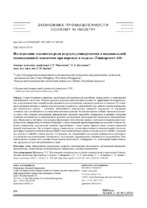| dc.contributor.author | Максимова, Т. Г. | |
| dc.contributor.author | Богданова, Е. Л. | |
| dc.contributor.author | Бровка, Г. М. | |
| dc.coverage.spatial | Минск | ru |
| dc.date.accessioned | 2020-06-09T09:54:31Z | |
| dc.date.available | 2020-06-09T09:54:31Z | |
| dc.date.issued | 2020 | |
| dc.identifier.citation | Максимова, Т. Г. Исследование изменения роли ведущих университетов в национальной инновационной экосистеме при переходе к модели «Университет 4.0» = Study of Changing Role of Leading Universities in the National Innovation Ecosystem during Transition to the University 4.0 Model / Т. Г. Максимова, Е. Л. Богданова, Г. М. Бровка // Наука и техника. – 2020. – № 3. – С. 258-266. | ru |
| dc.identifier.uri | https://rep.bntu.by/handle/data/73551 | |
| dc.description.abstract | Cтатья посвящена выявлению закономерностей деятельности российских университетов в национальной инновационной экосистеме. Решения вопросов развития инновационной активности, эффективной коммерциализации и внедрения научных разработок обосновываются в стратегических документах развития государства. От успешности внедрения научных и опытно-конструкторских разработок в значительной мере зависит уровень инновационной безопасности страны – состояния защищенности национальных интересов государства от внутренних и внешних угроз, возникающих в условиях инновационного развития. На ведущие высшие учебные заведения возлагаются задачи стать центрами региональных инновационных экосистем, превратить университеты в активных участников социально-экономического и инновационного развития. Для выявления закономерностей деятельности учреждений высшего образования в этой сфере использованы официальные статистические данные о деятельности национальных исследовательских университетов Российской Федерации. Анализ изменений проанализированных показателей позволил выделить университеты, реализующие наиболее перспективные, с точки зрения мирового опыта, модели управления научной деятельностью. Это, в первую очередь, университеты, для которых отмечается положительный относительный прирост показателей общего объема НИОКР, доли внебюджетных средств в доходах вузов от НИОКР, удельного веса доходов от НИОКР в общих доходах. Установлено, что современный этап развития университетов характеризуется наличием как конкурентных преимуществ, так и вызовов, формирующих особенности их модернизации. Реакцией на вызовы должно стать создание бизнес-модели деятельности «Университет 4.0», включающей новые технологии, продукты и услуги, востребованные в стране. | ru |
| dc.language.iso | ru | ru |
| dc.publisher | БНТУ | ru |
| dc.title | Исследование изменения роли ведущих университетов в национальной инновационной экосистеме при переходе к модели «Университет 4.0» | ru |
| dc.title.alternative | Study of Changing Role of Leading Universities in the National Innovation Ecosystem during Transition to the University 4.0 Model | ru |
| dc.type | Article | ru |
| dc.identifier.doi | 10.21122/2227-1031-2020-19-3-258-266 | |
| local.description.annotation | The paper is devoted to identifying patterns of activity of Russian universities in the national innovation ecosystem. Decisions on the development of innovative activity, effective commercialization and implementation of scientific developments are substantiated in strategic documents of state development. In fact the level of innovative security of a country, the state of protection of national interests of the state from internal and external threats arising from the conditions of innovative development, depends to a large extent on the success of the implementation of scientific and development projects. The leading higher education institutions are entrusted with the task of becoming centers of regional innovation ecosystems, transforming universities into active participants of socio-economic and innovative development. Official statistics on national research universities of the Russian Federation have been used in order to identify patterns of the activity of higher education institutions in this area. An analysis of the changes in the analyzed indicators has made it possible to single out universities that implement the most promising models of scientific activity management in terms of world experience. These are primarily universities for which there is a positive relative increase in indicators of total R&D, the share of extra-budgetary funds in university income from R&D, and the share of income from R&D in total income. It has been established that the current stage of development of universities is characterized by the presence of both competitive advantages and challenges that form the features of their modernization. The response to the challenges should be the creation of a business model of the University 4.0 activity which includes new technologies, products and services that are in demand in the country. | ru |

